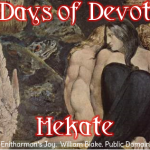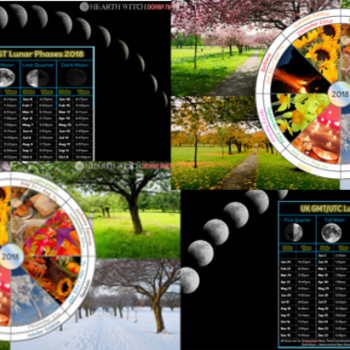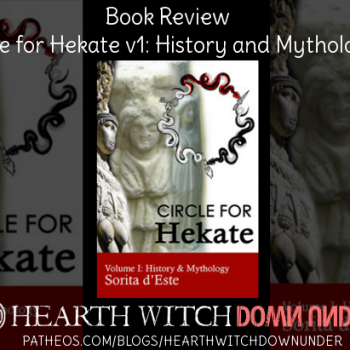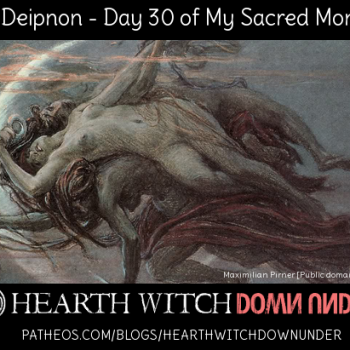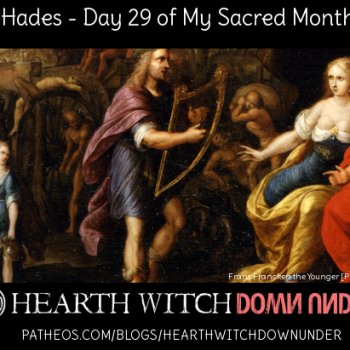This post is part of a blog challenge series, 30 Days of Devotion to Hekate. Day 9 and we are looking common mistakes and worst misconceptions about Hekate. Note, worst misconceptions was supposed to be for day 25, but it’s the same question twice in my opinion.
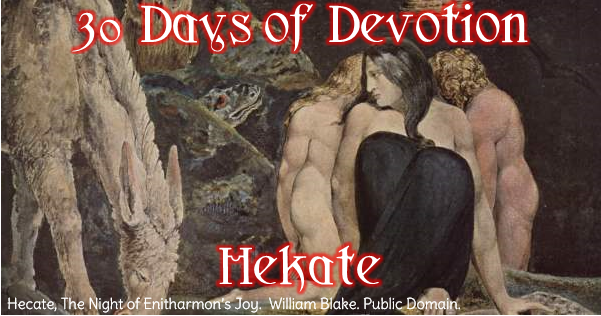
Evil
Pretty obvious one, right? But it is a very common view of Her, that She is evil and scary and horrible. I think this comes from multiple assumptions, and of course sources.
First source is Christianity. Yeh, as Christianity came to the fore they began to make Hekate into an evil Goddess. The reasoning is quite simple, She was very popular – even into Byzantium – and what better way to get rid of this Goddess who was limiting the One Gods worshippers than to turn Her into an evil version of herself.
Shakespeare I guess is another source with his portrayal of Hekate in Macbeth, but it’s quite minor. Crowley had more influence on this modern perception of Hekate with such phrases as, “[…]she is Hecate, a thing altogether of hell, barren, hideous and malicious, the queen of death and evil witchcraft.”
How does such come about and become so easily believed of Her?
The Underworld
She is a Chthonic Goddess, of the Underworld. In todays Christian influenced world, the only ‘underworld’ that is well known is Hell, and that place is horrible and full of evil things, apparently. Therefore, if Hekate is of the Underworld, it follows She must then be evil as well.
But of course, Hades’ Underworld is not the same as Hell, this is merely a conflation of two words that mean different things. Whilst there are hellish aspects to the Underworld, it is not Hell itself and it doesn’t actually follow that everyone and everything down there is evil. After all, the equivalent of heaven is also in the Underworld, so obviously it can’t be that evil.
Death, the Dead, Ghosts
She is a death Goddess and She leads the host of the Dead, ghosts. Death itself is considered evil by some people, and ghosts even more so – especially by those who know little about them. While ghosts, including those in Hekates train, can be “evil” or do horrible things, that doesn’t mean they all are and it certainly doesn’t mean the one who leads them is evil either.
I suppose some may also assume that Hekate is responsible for bringing death to us, as though She is a kind of Reaper – that assumption would make Her seem quite a bit more scary and evil. But it’s an assumption based on only the word “death” and nothing else.
Daimons and Demons
She controls daimons. I’ve explained in a previous post that daimons are not the same as demons, but the word is close enough to make no matter in this modern age where if it sounds like a duck, who cares if it looks like a mockingbird. Daimons are not evil, necessarily. They are minor deities themselves and some are good and helpful, some are not. Simple as that.
But Hekate is also mentioned in the Chaldean Oracles as being the ruler of angels and demons, so this perhaps doesn’t help. Except, I guess people ignore the angels part, which suggests She isn’t just ruling over demons and evil.
Darkness, The Night
It’s a funny thing, but those deities and creatures of the night are often assumed to also be evil. Perhaps this is some primal fear of the darkness in us, a fear of loss of light. The fact nasty folklore creatures generally come out at night probably doesn’t help matters – vampires for instance are killed by the daylight, therefore, night must be evil. The part where werewolves turn at full moon, joining both night and the moon, both aspects of Hekate, has double the effect on Her being evil.
The fact that Hekate is also a light Goddess seems to escape peoples notice.
I do have to wonder at the people who think all night things are evil though – possums are kind of cute, and owls are pretty awesome.
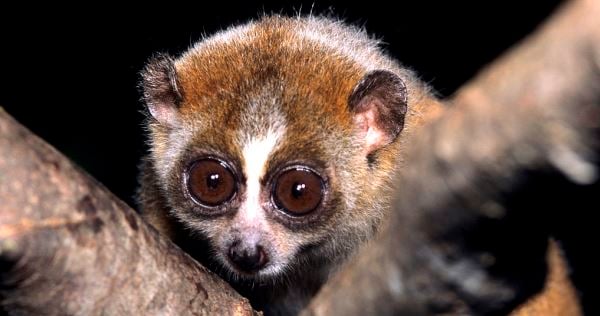
Crossroads and Cemeteries
Cemeteries I probably don’t need to go into, as it ties into the aforementioned death idea. Crossroads though, largely associated with demonic activity today – I may love Supernatural but they probably aren’t helping matters here – have a bit of history for being places that are, not so much evil, but places where evil gathers.
Witchcraft
I don’t think I really need to go into this one do I? Witches are evil, so Hekate the Goddess of Witchcraft must also be evil. But we’re actually not evil, mostly, and so neither is She. Go away.
Okay, I won’t go into how witchcraft is viewed as evil, instead let me point out how it is not. Witchcraft is the craft of using magic, what one does with it could result in something good or evil – just like a knife can carve a toy, cut up food or kill a person. Witchcraft can heal or harm, curse or bless, help or hinder, poison or medicate.
Witchcraft is merely a tool, it is not evil or good, it simply is. Even if every person who used witchcraft was evil, that still doesn’t make witchcraft itself evil – because some individual could still choose to use it for good. So it isn’t evil. And neither is its Goddess.
Hekate
Is not evil, but I am not sure we can entirely call Her good either – I, personally, don’t think the Gods can be categorised so easily into human terms. Hekate rules over things that can be good or evil, depending on the moment, the circumstances. She can bring us good or evil. She controls demons and angels, She is of the dark but She is a light Goddess too. She leads the dead, but She leads the living as well. If we can divide the Gods into good and evil, then Hekate is a balance and this seems right to me – as the Goddess of the Crossroads it does fit that She is in the middle, ready to help us along whichever path we choose.
The Crone
I had this big thing typed out for this misconception of Hekate, but then I thought, being so long, it is maybe better as its own post about the Triple Goddess rather than strictly about Hekate. So for this post I will keep it short and (not very) sweet.
A modern view of Hekate is that of Her as an old woman with silvery hair and wrinkles, looking ancient and wise but still beautiful. She is the Crone to Artemis as Maiden and Selene as Mother. I’ve already discussed this a few times in this series.
Hekate isn’t/wasn’t a crone or old woman historically. She was always a youngish woman, maiden or mother, but young. She wasn’t portrayed old, She wasn’t described as being old or taking on the role of someone who is aged – like Demeter was in the Rape of Persephone. She was always young.
The Triple Goddess, and Crone aspect therein, are a mix of influences from the witch stereotype of old women (and Hekate is the ultimate witch), Crowleys lore and Robert Graves’ ideas that were erroneously said to be based on history. We know Hekate existed as a triple Goddess with Selene and Artemis, at least in Roman times – but there isn’t anything to suggest any maiden-mother-crone triplicate. We also know that Hekate was a three formed Goddess in Her own right – but each of those three forms were, if human headed, always young (when I say young, I mean like 30ish).
There is more to it than all of that, a lot more, but as I said, I want to make a post about that in future.
There are people who know Hekate was never a crone in history, but they still see Her as the crone. And this is actually okay for the most part – She will be who She wishes to be when She shows Herself to us. If She assumes the role of crone for some people, then so be it. But it must be said, this is SPG (Shared Personal Gnosis), this modern conception of Her it is not lore, it is not based in history. Hekate as crone is SPG.
The biggest problem though, in my opinion, is that so many people have written about this modern view of Hekate and made it seem like it is historical, it is lore, it is fact. And so we have the problem where there are way too many people who don’t actually know that Hekate was a maiden historically.
UPG and SPG is fine, I won’t gainsay it. But asserting SPG or UPG as fact and universal is not okay. And people not being able to tell the difference between SPG and historical lore is also not okay.
Not just not okay, but it’s also a bit dangerous. As others before me have noted – when a deity behaves in ways that are completely contrary to their historical nature, it might be a good idea to go through all the various processes to find out if that deity is actually the deity they say they are! There are entities out there who will lie and trick people for their own advantage or pleasure – modern misconceptions and assertions of SPG as fact make this sort of thing far more likely.
You see Hekate as a crone in the triple goddess, good for you. But please know the difference between modern conception and historical lore. It’s not some trivial debate over historical purity – it’s actually a matter of safety.
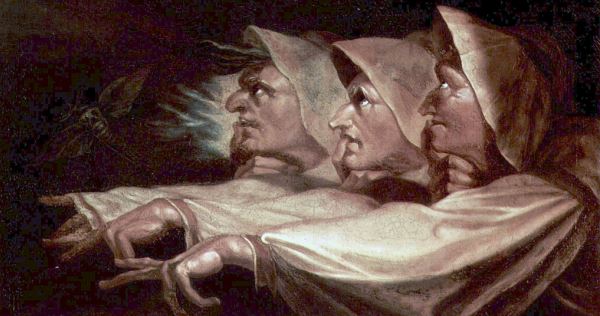
By Johann_Heinrich_Füssli. Public domain, via wikimedia commons.
30 Days of Deity Devotion
1 – A basic introduction of the deity
2 – How did you become first aware of this deity?
3 – Symbols and icons of this deity
4 – A favourite myth or myths of this deity
5 – Members of the family – genealogical connections
6 – Other related deities and entities associated with this deity
7 – Names and epithets
8 – Variations on this deity (aspects, regional forms, etc.)
9 & 27 – Common mistakes and worst misconceptions about this deity
10 – Offerings – historical and UPG
11 – Festivals, days, and times sacred to this deity
12 – Places associated with this deity and their worship
13 – What modern cultural issues are closest to this deity’s heart?
14 – Has worship of this deity changed in modern times?
15 – Any mundane practices that are associated with this deity?
16 – How do you think this deity represents the values of their pantheon and cultural origins?
17 – How does this deity relate to other gods and other pantheons?
18 – How does this deity stand in terms of gender and sexuality? (historical and/or UPG)
19 – What quality or qualities of this god do you most admire? And find the most troubling?
20 & 21 – Art and music that reminds you of this deity
22 – A quote, a poem, or piece of writing that you think this deity resonates strongly with
23 – Your own composition – a piece of writing about or for this deity
24 & 25 – A time when this deity has helped you, and refused to help
26 – How has your relationship with this deity changed over time?
28 – Something you wish you knew about this deity but don’t currently
29 – Any interesting or unusual UPG to share?
30 – Any suggestions for others just starting to learn about this deity?

